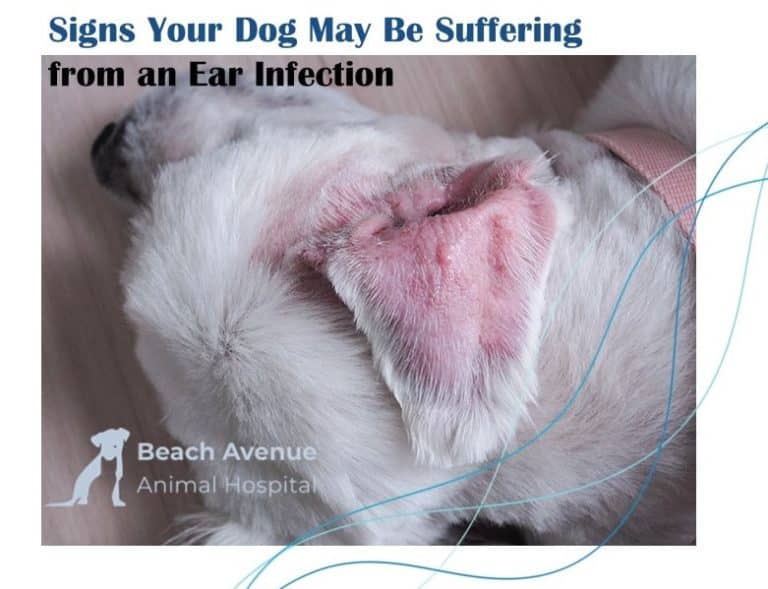At Beach Avenue Animal Hospital, we understand how deeply you care for your furry family members and how distressing it can be when they face health challenges.
Dog Aural Hematomas are a common concern, involving a painful swelling in the ear flap caused by the accumulation of blood. Without proper treatment, this condition can cause discomfort and lasting issues. Our team is highly experienced in providing effective treatment in dogs who have aural hematoma, ensuring your pet’s comfort and speedy recovery.
What is an Aural Hematoma?
An aural hematoma occurs when blood collects between the layers of your dog’s ear flap, creating a swollen, fluid-filled pocket. This condition is typically the result of trauma, such as excessive head shaking or scratching, often caused by underlying issues like ear infections or allergies.
Common signs include:
- A visibly swollen ear flap, soft or firm to the touch.
- Redness and tenderness.
- Your dog’s discomfort, such as head tilting or frequent scratching.
Understanding the root cause is crucial to effective treatment, so always consult a veterinarian for an accurate diagnosis.
Why Do Aural Hematomas Occur?
Aural hematomas are usually secondary to other health issues. Here are some common causes:
- Ear Infections: Bacterial or yeast infections lead to irritation and head shaking.
- Allergies: Environmental or food allergies may cause chronic ear inflammation.
- Parasites: Mites or fleas can trigger intense itching and scratching.
- Trauma: Minor injuries during play or accidents may rupture blood vessels in the ear flap.
Addressing these underlying issues is essential to prevent recurrence and ensure your dog’s long-term well-being.
How to Treat Aural Hematomas in Dogs
Treating an aural hematoma requires professional intervention to alleviate your dog’s discomfort and prevent complications. Here are the most common options:
1. Non-Surgical Treatment:
- Drainage: A veterinarian may use a needle to drain the fluid. While this offers temporary relief, recurrence is common if underlying issues aren’t addressed.
- Corticosteroid Injections: Anti-inflammatory medications can reduce swelling and promote healing in mild cases.
2. Surgical Treatment:
- Hematoma Repair Surgery: This procedure involves making an incision, draining the fluid, and suturing the ear flap to prevent refilling. It’s highly effective for moderate to severe cases of aural hematoma dog ear conditions.
- Aftercare: Your dog may need an Elizabethan collar to prevent scratching and prescribed medications for pain and infection prevention.
3. At-Home Remedies:
- While professional care is essential, you can clean and soothe your dog’s ears with veterinarian-approved solutions to address underlying causes like infections.
With our expertise in treatment for aural hematoma in dogs, we ensure a comprehensive approach to your pet’s recovery.
When to Seek Veterinary Care
If your dog shows signs of an aural hematoma, it’s crucial to seek prompt veterinary care. Delaying treatment can lead to complications such as permanent ear deformities (“cauliflower ear”) or persistent discomfort. Watch for symptoms like:
- Significant swelling or redness in the ear flap.
- Persistent head shaking or scratching.
- Signs of pain or lethargy.
Aural Hematoma Dog Pictures
Visual identification is often helpful for pet owners. Swelling from an aural hematoma in dogs can range from mild puffiness to severe, balloon-like distortions. Understanding what to look for can prompt timely veterinary attention. Always compare the affected ear to your dog’s normal ear to spot abnormalities.



Where and How to Prevent Aural Hematomas
Prevention starts with regular care and addressing risk factors:
- Routine Grooming: Clean your dog’s ears with a veterinarian-recommended solution to prevent infections.
- Pest Control: Keep your dog’s environment free of fleas and mites.
- Protective Gear: For dogs prone to ear injuries, consider using ear protection during play or outdoor activities.
By minimizing triggers such as allergies and infections, you can greatly reduce the likelihood of a canine aural hematoma developing.
Conclusion
Aural hematomas, while distressing for both dogs and their owners, can be effectively managed with timely and appropriate care. At Beach Avenue Animal Hospital, we specialize in Pet Surgical Services in Vancouver and have extensive experience in treating aural hematoma dog cases. If you suspect your dog may have an aural hematoma, don’t hesitate to contact our compassionate team for expert advice and treatment options.
Let’s work together to keep your beloved companion healthy and happy!
FAQs and Common Concerns
What happens if an aural hematoma is left untreated? Untreated hematomas can lead to chronic pain, ear deformity, or even hearing loss.
Is surgery always necessary for an aural hematoma? Not always. Small hematomas can sometimes resolve with non-surgical treatments, but larger or persistent ones usually require surgery.
Can an aural hematoma come back after treatment? Yes, if the underlying cause isn’t addressed, recurrence is possible.
How much does aural hematoma treatment cost? Costs vary depending on the severity and treatment type. Consult our team for an accurate estimate.
How long does it take for a dog to recover from an aural hematoma? Recovery typically takes 2-3 weeks, depending on the treatment method and aftercare.










